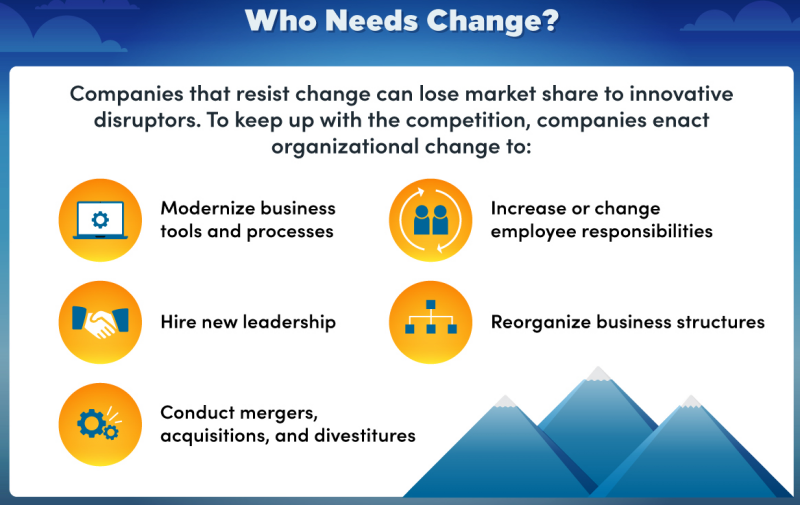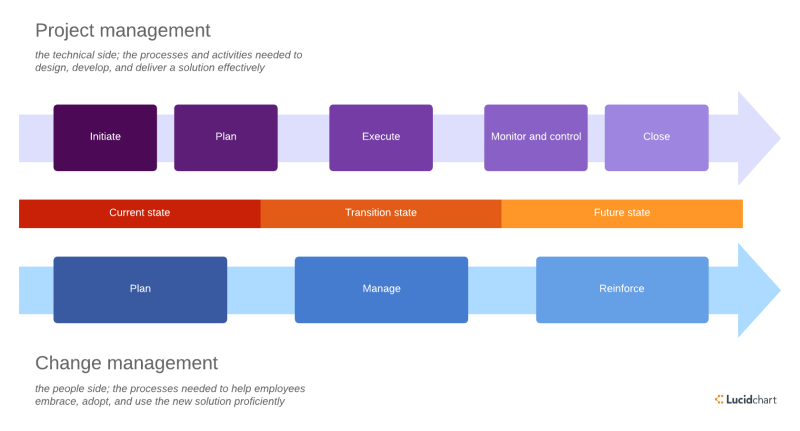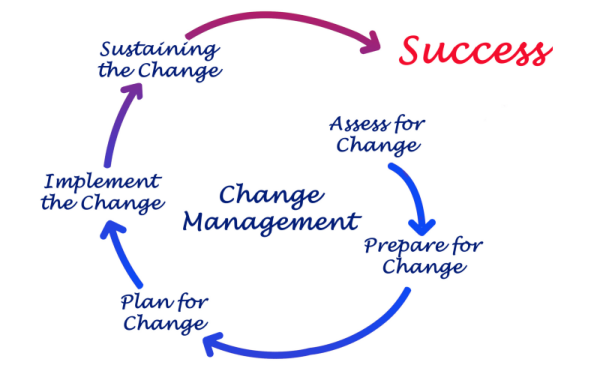Is Change Management Part of Project Management?

Project management is the discipline and process of helping bring a product, service, team, or organization from point A to point B. Before, during, and at the end of this transition, changes happen. At the end of a successful project, significant and lasting impact occurs that affect more than the stakeholders of the project team.
While the project team focuses on fulfilling the strategic and technical objectives of a project, another team should manage the uncertainty that goes with the changes brought about by the project. If not managed properly, the uncertainty can lead to anxiety, confusion, or resistance from the rest of the organization — who may not fully understand the need or purpose of the changes.
Table of Contents
What Is Change Management?
Change management is the structured approach to managing the infinite number of changes that occur as an individual, team, and organization move from a current state to a desired future state. It is the discipline that provides guidance on how to prepare, equip, and support affected individuals to successfully adopt change and smoothly transition towards improvement, achievement, desired outcomes, and success. Change managers help people transition through three process stages:
- Planning for change
- Managing change
- Reinforcing change
Read also:
How to Effectively Manage Change with Project Management
Back to top
Levels of Change
Since a wide range of changes can occur, one way to manage them is to categorize them into different levels. Separating change management approaches into different levels allow change managers to help employees adopt the changes at the right pace and support them toward continuous improvement.
Individual Change Management
Individual change management is the understanding of how individuals experience changes and how successfully they adapt on a personal level. Change managers try to discover what will help an employee make a positive transition and use disciplines like psychology to encourage change from a behavioral standpoint.
Organizational Change Management
Organizational change management is managing change at a project level involving groups of individuals or teams and how they can all succeed for the sake of the project. Since it is difficult to manage change on a person-by-person basis, implementing steps on a project level allows for wider coverage and greater impact. But organizational change should align with project management so all involved will adopt the project’s solution and also embrace the change recommendations.
Enterprise Change Management
Enterprise change management is managing change to an entire organization’s core competency, resulting in adaptation and competitive differentiation. After individuals and teams have embraced changes, embedding the changes at the core values of the enterprise is the final step. At this point, the changes have become part of the organization’s culture and meeting the objective of change management.
 Back to top
Back to top
Differences Between Change Management and Project Management
Project management and change management are similar because they both involve managing people and processes. Although they often happen together to meet their respective goals, they are different disciplines. At its core, project management is about seeking to achieve clearly defined outcomes within the triple constraint of time, scope, and budget. Change management is frequently incorporated into project management. Changes to systems, processes, structures, and roles have both a technical side and a people side. The technical side is what project management is about while the people side is what change management is all about.

Understanding these differences in technique and implementation allows managers to correctly implement the two and therefore efficiently and effectively achieve an organization’s desired objective. Some of the core differences are:
Timeline
Project management is about deciding on a schedule and sticking to it. Change management, on the other hand, has no concrete
timeline but instead focuses on gathering input from stakeholders throughout an entire process indefinitely.
Milestone
Project management establishes milestones before the project begins and uses them as a tool to keep processes on track. In change management, there are no predefined milestones because participation and input from stakeholders are often unpredictable and can alter the process in innumerable ways.
Scope
Project management limits the scope that the team defines before the onset of a project to avoid
scope creep. In contrast, change management doesn’t have a defined scope and is not defined at all. The idea is to deal with whatever happens so that stakeholders can drive the organizations efficiently and effectively towards desired objectives.
Guidelines
Project management has well-documented guidelines and standards while change management has no standard guidelines. However, change management can be more successfully implemented if managers will use a structured approach.
Processes
Project management puts focus on technical processes and systems. Change management includes less formal processes and instead puts focus on people.
Management
Project teams manages the activities of a project to meet specific goals and requirements. Change management teams manage the impact of change resulting from organizational developments or project implementations.
Back to top
Skills Required of a Change Manager
So, what exactly does a change manager do? The core job of a change manager is to guide, communicate, implement, and document strategies to smoothly manage change and its effects among stakeholders like employees, leadership, customers, or suppliers. Change managers assist people to adopt or buy into the organization’s objectives and activities with the least possible resistance, while at the same time mitigating the organization’s risk, and minimizing adverse impact on the people.
Effective change management requires the following:
- Complete and active support of the executive and leadership
- Active participation and involvement of employees
- Effective communication
- Strategic planning and analysis
- Adoption of the idea about the need to change among stakeholders
There is a diverse skill set required to successfully bring about change in an organization. Some of the vital skills a change manager requires are as follows:
Communication Skills
Effective communication skills are important at every point of a change project. Change managers need to directly communicate with all stakeholders, from the leadership to those with the most junior roles. They need to understand each person’s requirements. They have to contextualize individual and organizational needs while making the organization’s objectives relevant to the individual. It is essential for change managers to gain support from all stakeholders by communicating a strong value proposition.
Coaching Skills
Change managers impart skills, give directions, encourage, and support all stakeholders. They need to have a thorough understanding of the methodologies, best practices, and frameworks that are most effective when coaching at the different levels of an organization.
Strategic Skills
The skills to tap internal and external resources, plan, effectively implement, and assess the impact of changes made are crucial. Change managers often need to mitigate resistance and support stakeholders to appreciate the process of change.
Project Management Skills
To successfully apply individual, organizational, and enterprise changes through a change management plan, change managers use their skills to assess change from a people perspective as well as from a technical standpoint. The primary objective is to ensure that teams deliver change correctly, while the rest support and accept them. As such, having the necessary project management knowledge, tools, and techniques, like outlining dependencies, outcomes, resources, and responsibilities, while monitoring change, assessing progress, and being flexible are vital.
Back to top
Change Management Career Benefits
The role of a change manager is exciting and important, especially in today’s business landscape. Some benefits are uniquely available to a change manager.
Salary
The salary of a change manager or change management consultant varies based on several factors including location, size of the organization, and industry. At present, the annual salary of a change manager in the U.S. ranges from $100,500 to $189,500, with a national average of $144,718, according to ZipRecruiter.
Read also:
How Much Do Project Managers Make?
Familiarity With Change
Change managers have a better understanding of the requirements and processes of change in organizations. They can easily adjust and adapt in a constantly changing job market and in a changing economic climate.
Global Marketability
Change is ubiquitous across countries, regions, and continents. And because change management provides the tools to contextualize all kinds of change, change managers can easily fit into any environment across the globe.
Project Success
Change managers can manage both technical and personal facets of a project. The ability to comprehend, communicate, and cover responsibilities of both aspects of a project exponentially increases the chances of project success.
Organization ROI
By managing both the human and technical factors in a project, change managers can efficiently and effectively design, lead, and mitigate risks in a change and project strategy. Ultimately, the result is a positive impact in an organization’s bottom line measured by an increase in ROI.
 Back to top
Back to top
Ready to Explore a Career in Change Management?
Project management is about following processes and implementing defined steps towards achieving an organization’s objective. Change management provides the methodology to contextualize and manage the infinite number of changes that can impact individuals and projects towards achieving an organization’s objective. Understanding how both project management and change management should work together is crucial for the success of an organization. Since growth and change are inevitable, change management is a key piece of organizational success and also a great career to get into.
Back to top
 Project management is the discipline and process of helping bring a product, service, team, or organization from point A to point B. Before, during, and at the end of this transition, changes happen. At the end of a successful project, significant and lasting impact occurs that affect more than the stakeholders of the project team.
While the project team focuses on fulfilling the strategic and technical objectives of a project, another team should manage the uncertainty that goes with the changes brought about by the project. If not managed properly, the uncertainty can lead to anxiety, confusion, or resistance from the rest of the organization — who may not fully understand the need or purpose of the changes.
Project management is the discipline and process of helping bring a product, service, team, or organization from point A to point B. Before, during, and at the end of this transition, changes happen. At the end of a successful project, significant and lasting impact occurs that affect more than the stakeholders of the project team.
While the project team focuses on fulfilling the strategic and technical objectives of a project, another team should manage the uncertainty that goes with the changes brought about by the project. If not managed properly, the uncertainty can lead to anxiety, confusion, or resistance from the rest of the organization — who may not fully understand the need or purpose of the changes.
 Back to top
Back to top
 Understanding these differences in technique and implementation allows managers to correctly implement the two and therefore efficiently and effectively achieve an organization’s desired objective. Some of the core differences are:
Understanding these differences in technique and implementation allows managers to correctly implement the two and therefore efficiently and effectively achieve an organization’s desired objective. Some of the core differences are:
 Back to top
Back to top





